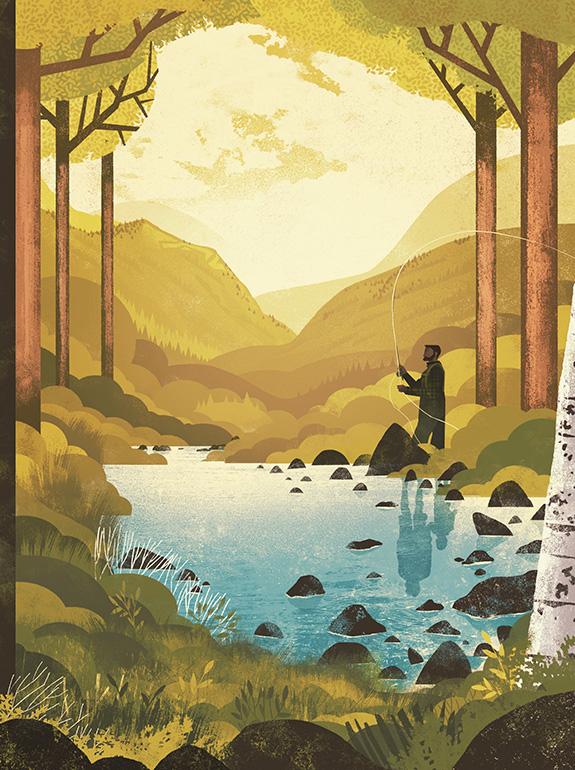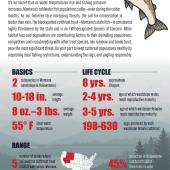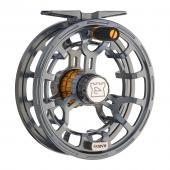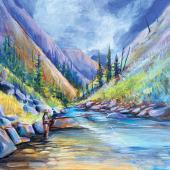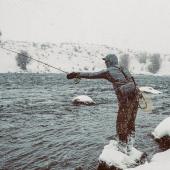How Time Flies
Memories flow like water after a lifetime on the river.
If there’s such a thing as a universal thread running through my universe, connecting years, setting place markers, binding in some small way the smaller purpose of one man’s existence here on Earth, mine is made of monofilament. It runs through the guides of a bamboo fly rod, down into the waters of an early-fall stream, where its terminus is a tattered grasshopper fly anchored in the upper jaw of a male brook trout.
I have come back to this place, high in the mountains of Montana on a hazy September day, to remind myself of this. To confine my world, if only for a few hours, to the smooth arc of a rod when a good fish strikes, the scent of summer gone by, the disconcerting feeling that through the warm temperature of high noon, winter’s tentacles already creep, and to pay tribute to something I’ve loved doing all my life.
I have returned, as instinctively as the salmon which finds the pool where it was born after years in the ocean, to cast a line through time and space, letting it cut across a thousand memories of a thousand similar places where I fished with my father.
Today, I am fishing alone. My clock still runs on summer time, stirring me from sleep inside my tent a full hour before any hint of daylight. Like some oversized reptile needing warmth before motion, I slither awkwardly toward a small cooler, my sleeping bag wrapped tightly around me. It’s iced coffee this morning, full of the caffeine I need but entirely devoid of the heat I crave. I could have brought my JetBoil—that ingenious flamethrower that has helped me make dozens of cups of strong, instant coffee over the years—but Montana is burning all around, hundreds of thousands of acres already gone up in smoke, so today cold coffee will do. I sip it at the screen door of my tent, staring out into a dark world where only the tips of dead spruce stand out against a sky whose eastern horizon is a half-shade closer to the gunmetal grey of predawn.
It’s a quiet time of year. Young birds have fledged, elk calves have lost their spots while their father’s antlers have lost their velvet, and a tangible lull has settled across the land. Summer still controls the seasons, but her embrace is like a lover’s at an airport before a long journey.
The uneasiness I feel must stem from a time when winter meant more inconvenience than shoveling snow and a truck slow to warm. My mind floats back to a day on the opposite end of the solstice and opposite end of the country when I caught my first trout in northern Vermont. I wasn’t quite three years old, dipping a worm into a frigid April brook while my father adjusted the straps of the pack he carried me in. I watched it vanish below the milky surface of a stream equal parts water and snow, felt the tap of something living—the tug of life electrifying the rod I held—and, though I was unsure whether it came from something living in the brook or was the brook, heaved upward with all my might. A five-inch, pale trout sailed into the air, seemed to hang for a split second against a backdrop of exposed hemlock roots, gnarled alders, and a stubborn drift of needle-covered snow, then fell to a gravel bar where flecks of mica gleamed.
My father, perhaps forgetting his young son was tethered to his back in a contraption of bent aluminum poles and faded, blue canvas, launched off the bank, knocking me hard against his denim coat when he landed near the fish.
There was no discussion of releasing it, and even before its last spasms of life had departed, crimson blood running from its gills, I held it. I see it now as though the decades between us don’t exist, the hazy blue rings around its red spots, the white edges of its fins the color of milk poured in deep shade. It’s a good memory, and a good place to start this day, I think, as I dress and step into the smoky world of Montana in September.
Walk up and then fish back. That’s my plan, if I can call so loose a day’s schedule a plan, but in less than half a mile the gravity of the brook sucks me in and I find myself false-casting, stripping line, aiming my fly toward a sliver of water between narrow, grassy banks before I’ve even seen the sun. I’m rusty, and the fly falls short, in the stream but out of view. I listen for the telltale slap of a striking fish, but it’s too early in the day and no insects are awake. I jerk the rod skyward, imbed the fly in streamside sage, and spend the next few minutes untangling the leader from stout, woody branches. Walk up and fish back, I remind myself.
There’s a horse trail to follow, a dusty path pocked with cattle tracks and less frequently the sharper hoof prints of elk and deer. It leads across meadows where a pair of rusty hay rakes, sage grown up among their tines, stand as markers to some bygone family’s determination. Beyond them, where fir crowd the valley down to a hundred yards wide, a rail fence snakes through the timber, another testament to man’s resolve. Moss has taken root in the wood, thick, green hair growing heavy on the north-facing sides.
We’re an egotistical lot, I think, stopping to take a picture. For 20 years, my father and I considered this stream “our” place to fish. Before that, it was someone else’s—a spot to cut hay and chisel out a life inside mud-chinked cabins. And before that it may have been the favorite haunt of a fur trapper, his own private valley. This moss, much of it anyway, was here in 2012 on the last day my father and I fished this stream. It grows slowly and probably hasn’t changed much, though in its steady consumption of these rails it speaks to the foolish notion that this country belongs to anything else. Though never uncomfortable in the woods, I feel something prickle the back of my neck and fight the urge to turn and look over my shoulder, subconsciously beginning to whistle, a rough approximation of Delta Dawn, another subconscious nod to another morning fishing with my father more than 30 years ago.
On that day we’d stopped at a true country store—odd-dimension one-bys lending floor space to a hodgepodge of household goods mixed in with Wise potato chips, a battered Coca-Cola cooler half full of ice and Nehi soda bottles, and a long, glass-topped freezer where I found a Hood ice-cream sandwich. Back in our car, a scratchy AM radio station played the song. And then “Angel of the Morning.” And then for the first time, “Luckenbach Texas.” We were crossing a wrought-iron bridge built in 1928, the names of the town selectmen embossed on a plaque attached to its west side, when my father looked at me and said, “That, mister man, is a great song.” I whistle a bar of it, too, the notes swallowed by forest and moss and time.
Here, the trail crosses the brook to skirt a willow bog where I’ve seen moose. I think about leaping out onto a midstream rock and then remember the Vermont woodsman adage, “Never go under anything you can go over, never go over anything you can go around.” It doesn’t specifically address jumping onto a wet rock, but I extrapolate a strong condemnation of the act and look instead for an easier crossing. I find one a short distance downstream where the channel splits and I can easily step across both forks.
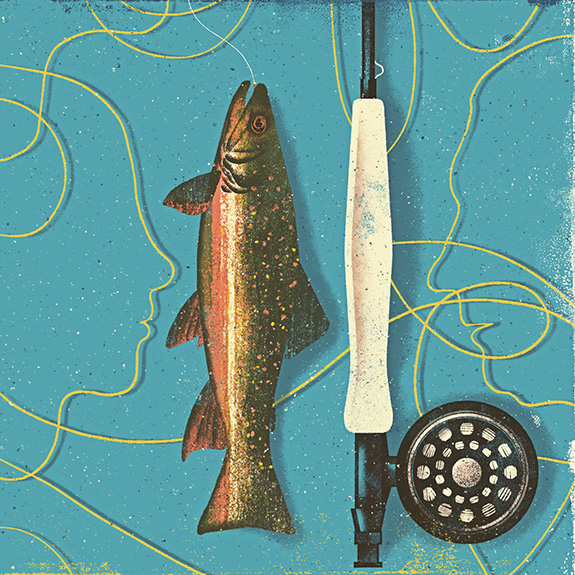
The sun is up now, already high enough to make the shade of heavy timber feel good where the trail jogs through granite boulders and steeple-shaped spruce. I’ve covered nearly three miles and I smile, wondering how in the hell I can remember which songs played on the radio when I was a kid but not much about today’s walk.
And now, silent wings overhead. The barred owl glides, landing close to the trunk of a large lodgepole pine. One photo and he’s gone, but my memory turns to the one my father and I found dead along a brook, balsam needles held fast in its talons, its neck broken from a misguided strike on a squirrel. We caught nine trout that evening. I remember writing it in the green-backed journal where I chronicled our fishing. We caught nine trout, saw painted trilliums and cowslips, and found a dead barred owl. 1984. Suddenly, I want strong sunshine. No more of this dappled world of long shadows and old memories. I pour on triple-time speed, not pausing until I break out of the timber into more meadows.
Another mile, I think. On the upstream side of Horseshoe Gate, my own moniker, much like the Chipmunk Brook, Mrs. McCormick’s Brook, the Creek, and the other places I fished in Vermont without ever using their “real” names. In full daylight, I find it easier to remember such places, thinking back to alder-choked beaver bogs where peeper frogs drowned out all sound save the white-throated sparrow’s long call at dusk. Of air thick with black flies and the pungent odor of Deep Woods Off. Of hardwood forests where leaves fell after a night of October frost, each one a crisp footstep of winter drawing closer, some spinning down the brook my father and I fished, a boy’s sadness at summer’s end as tangible as the red and orange sugar-maple flotillas drifting by above our worms.
I feel it again today. There is more this time, I know, passing the giant boulder where my mom and dad ate lunch with me ten years ago. Where my mother found a slender bluebird feather she later framed and mailed to me. Where peanut butter and jelly bled through bread and Coke from cans tasted warm and tinny. Where the same fly rod I carry now leaned against a pine stump whose mottled trunk we remarked on then and I find just as striking today.
It’s time to fish. A freshly hatched mourning cloak butterfly fans its wings from the trunk of a squat pine, a colorful indication that the day has progressed sufficiently to awaken all insects, including the grasshoppers my fly imitates. I give one glance to Horseshoe Gate, see my father leaning on the rails in 2012, his features dissolving into the woods behind him, then begin catching brook trout.
I fish this day downstream through Montana’s Stewart Meadows on Warm Springs Creek, but with each cast my line cuts across the Vermont streams of Taft and Snyder, of Cutler Mill and Clough, of Jacob’s Chopping Brook and Stanhope. I leave footprints in the sand exposed during spring’s snowmelt like the wolf prints my father and I saw filling with water along the Chateguay River in Newfoundland. I catch trout until my grasshopper fly is so battle-weary that I exchange it for a heavy-hackled muddler that the fish don’t want quite as much. I pass Douglas fir and Engelmann spruce, but I see the cone-shaped balsam on the dam-side of a bog in the Northeast Kingdom where Band-Aid boxes with rusty hinges held worms dug from compost piles of coffee grounds and squash rind and trout lay in a wicker creel lined with fiddlehead ferns.
In the early afternoon of early fall, I sit on a shaded rock where the stream bends through old trees. Forest fires are raging 70 miles west of me, tiny bits of ash falling like the snow my sister said drifted straight down through woodsmoke on the winter day my father died. I was on the upper Missouri River that morning, not catching the brook trout he loved, but hard-fighting rainbows which, in the dead of winter when streams like Warm Springs lie buried under five feet of snow, I figured we could make an exception for.
I released each fish I caught that day, no doubt angering my namesake—a whiskey-running veteran poacher who succumbed to pneumonia after shunning his doctor’s advice to abstain from fishing for Vermont rainbows long ago. At some point that day, while line sung through my guides and a heavy fish pulled upstream, he may have had occasion to admonish my father—to tell him he’d done a fine stroke by lending me his name but a bit more tutelage in the finer points of limit violations, not to mention the benefits of a fish-rich diet, would have stood me in better stead.
For an instant, I consider keeping enough brook trout to make a meal, but I fish on through the afternoon without doing so. They’re beautiful, I think, and I like to imagine them here. I may catch some of the same ones next year when I return or, if it’s five years again before my footsteps fall along these banks, perhaps some of their descendants.
Time, like water, goes somewhere, and in the evening my time has returned me to the meadow where I began this day before sunrise. At some point, I’ll have to make that last cast, I know. It’s something I don’t want to think about. Not just yet. I slow my steps, careful to fish every pocket. Each riffle. Any little place where an undercut bank might hold a trout.
I’m dragging my boots when I notice a colorful jasper-hide scraper lying in the dirt of a mole digging. I wash it in the stream and hold it tight, realizing that the fur trapper I imagined earlier wasn’t nearly the first person here.
“What did you see along this stream then?” I ask the sky as the sun falls. I get no reply, nor do I really expect one. That conversation will have to wait.
At last it is too dark to see my fly. The breeze is shifting and the smoke is clearing, and already stars are peeking out. I draw a long breath and exhale slowly. I may have already breathed some of the same molecules my father and I did when we fished here five years ago. Perhaps some are part of the barred owl I saw, or make up a few of the grasshoppers I flushed near Horseshoe Gate, or lie inside a single scale of a single fish I caught. Maybe they’ve been absorbed by the brook, carried to the ocean, and fallen as rain halfway around the world.
I think about it again, later that night when the day’s memories blend so completely with ones from so long ago that they seem a perpetual stream. No beginning, no end. As I lie on my back and stare up at the night sky, into the band of stars that is the Milky Way, I wonder if some of what I breathed today came from out there.
We live in a spiral galaxy, I know, but our view of it from here on Earth makes it look like a rainbow. A rainbow, or, it occurs to me on the verge of sleep, a river.

